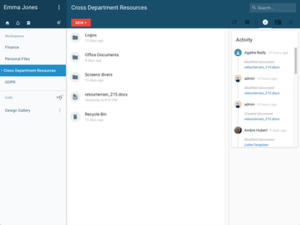Pydio
Pydio, formerly known as AjaXplorer, is an open-source file-sharing and synchronisation software that runs on the user's own server[3] or in the cloud.[4]
_2008-07-21.svg.png) | |
Screenshot  Pydio Cells (Browser view) | |
| Original author(s) | Charles Du Jeu |
|---|---|
| Developer(s) | Pydio |
| Initial release | 16 May 2018 (Pydio Cells - Go version) |
| Stable release | |
| Repository | cells on GitHub |
| Written in | Go (Pydio Cells), PHP (Pydio PHP version) |
| Operating system | |
| Platform | X86-64 (Pydio Cells; ARM under development), any that runs PHP (Pydio PHP version) |
| Size | |
| Available in | 11 languages[1] |
List of languages English (UK), English (US), French, German, Italian, Japanese, Latvian, Portuguese (Brazilian), Russian, Swedish, Vietnamese
| |
| Type | Cloud storage, File sharing, Data synchronization |
| License | GNU AGPLv3.0 |
| Alexa rank | |
| Website | www |
Presentation
The project was created by musician Charles Du Jeu[5] (current CEO and CTO) in 2007 under the name AjaXplorer.[6] The name was changed in 2013 and became Pydio (an acronym for Put Your Data in Orbit).[7] In May 2018, Pydio switched from PHP to Go with the release of Pydio Cells[8]. PHP version reached end-of-life state on 31 December, 2019.
Pydio runs on any server supporting a recent Go version.
The current offering of Pydio, known as Pydio Cells, has been developed from scratch using the Go programming language.[9] Nevertheless, the web-based interface of Cells is very similar to the one from Pydio 8 (in PHP), and it successfully replicates most of the features, while adding a few more. There is also a new synchronisation client (also written in Go).[10] The PHP version is being phased out as the company's focus is moving to Pydio Cells, with community feedback on the new features.[11] According to the company, the switch to the new environment was made "to overcome inherent PHP limitations and provide you with a future-proof and modern solution for collaborating on documents".[12]
From a technical point of view, Pydio differs from solutions such as Google Drive or Dropbox.[13] Pydio is not based on a public cloud,[14] the software indeed connects to the user's existing storages (SAN / Local FS, SAMBA / CIFS, (s)FTP, NFS, etc...) as well as to the existing user directories (LDAP / AD, SAML, Radius, Shibboleth...),[14] which allows companies to keep their data inside their infrastructure, according to their data security policy[15] and user rights management.[14]
The software is built in a modular perspective; various plugins[16] allow administrators to implement extra features.[17]
Pydio is available either through a community distribution,[3] or an Enterprise Distribution.[18]
Features
- File sharing between different internal users and across other Pydio instances[19]
- SSL/TLS Encryption
- WebDAV file server
- Creation of dedicated workspaces, for each line of business / project / client, with a dedicated user rights management for each workspace.[20]
- File-sharing with external users (private links, public links, password protection, download limitation, etc.)[21]
- Online viewing and editing of documents with Collabora Office
- Preview and editing of image files
- Integrated audio and video reader
Client applications are available for all major desktop and mobile platforms.[22]
References
- Translation is mostly done by volunteers in Crowdin
- "pydio.com Competitive Analysis, Marketing Mix and Traffic - Alexa". www.alexa.com. Alexa. Retrieved 2020-02-29.
- Thomas Saliou (2016-08-19). "How to Deploy On-Premise File Sharing and Sync with Pydio". ProgrammableWeb. Retrieved 2016-09-25.
- "Pydio". Retrieved 2016-09-25.
- Christophe Lagane (2013-12-13). "Start-up : Pydio, le partage de fichiers qui surfe sur la peur de Prism" [Pydio, file-sharing which surfs on the fear of Prism] (in French). fr:Silicon.fr. Retrieved 2016-09-25.
- "About-Us - Pydio". 22 January 2019.
- van 't Ende, Ben (May 19, 2016). "The future of sharing: integrating Pydio and ownCloud". Opensource.com. Retrieved 26 August 2016.
- "First Cells Release". GitHub. Retrieved 2020-03-24.
- "Pydio Re-Invents Open Source File Sharing For The Enterprise" (PDF). Pydio. 2018-05-16. Retrieved 2020-02-28.
- "CellsSync 0.9.1 - First public release for Cells desktop sync client". Pydio. 2019-11-07. Retrieved 2020-02-28.
- "Pydio 8 vs Pydio Cells - Which version should I install?". Pydio.com. 2020-01-06. Retrieved 2020-02-28.
- "Pydio Cells reaches stable state!". Pydio. 2018-05-16. Retrieved 2020-02-28.
- Cyrille Chausson (2013-12-04). "Pydio et Red Hat, ensemble pour attaquer le marché français des " Box " d'entreprises" [Pydio and Red Hat come together to attack the French market for enterprise "boxes"] (in French). LeMagIT (TechTarget). Retrieved 2016-08-22.
- Maryse Gros (2014-12-03). "Pydio adapte le partage de fichiers à l'entreprise" [Pydio adapts file-sharing for the enterprise] (in French). fr:Le Monde Informatique. Retrieved 2016-08-22.
- Mikael Ricknäs (2016-06-03). "French startups are taking a more privacy centric approach file sharing". PC World. Retrieved 2016-08-22.
- "Plugin Architecture". 2016-06-03. Archived from the original on 2016-09-16. Retrieved 2016-08-22.
- "Pydio Plugin List".
- Emilien Ercolani (2015-12-09). "Partage de fichiers : Pydio accélère et dévoile une version pour les entreprises" [Pydio speeds up and unveils an enterprise version] (in French). L'Informaticien. Retrieved 2016-09-25.
- "Pydio Core 6.4.0 - Sharing, UX, Performances". 2016-03-29. Retrieved 2016-08-22.
- Dmitri Popov (2015-03-12). "Pydio-Tutorial" (in German). de:Pro-Linux. Retrieved 2016-09-27.
- "Pydio, ou le partage sécurisé en ligne" [Pydio, or secure online sharing] (in French). Demat Infos. 2015-12-08. Archived from the original on 2016-04-12. Retrieved 2016-09-25.
- "How To Host a File Sharing Server with Pydio on Ubuntu 14.04". DigitalOcean. 2016-04-29. Retrieved 2016-09-27.
External links
- Official website
- cells on GitHub (Pydio Cells)
- cells-sync on GitHub (Pydio Cells Synchronisation Client)
- pydio-core on GitHub (Pydio PHP version, to be deprecated after December 2020)